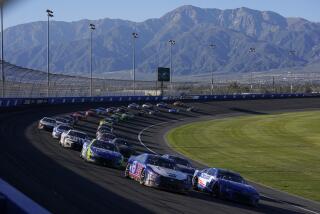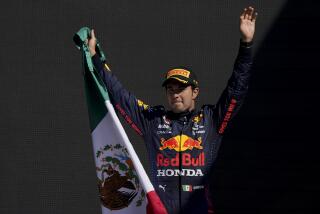Another Fangio Driven to Enter Family Business : Auto racing: Juan Manuel Fangio II, who will race at Del Mar this weekend, carries the name and desire that has meant greatness in Grand Prix racing.
- Share via
DEL MAR — The blood is thicker than motor oil, the racing blood that courses through the veins of Juan Manuel Fangio II. It is filled with corpuscles of speed and danger. It has been that way all his life. His father built race cars and his uncle won five world championships. When the doctor who delivered Ruben (Toto) Fangio’s child suggested the boy be named after his uncle, the Argentine racing hero, another driver was christened.
Racing blood.
It’s high viscosity.
“He genuinely enjoys doing this,” said legendary driver and car builder Dan Gurney. “He’s a virtuoso.”
Gurney should know something about virtuosos and driving--he has twice been named Builder of the Year by the Society of Automotive Engineers and his father was a Metropolitan Opera star.
And Fangio’s uncle was a bona fide racing legend, almost universally acclaimed as the best of his time. He went to Europe when he was 39 and won five World Grand Prix championships in four makes of cars during the 1950s, including four championships in a row. Last year, he became the first inductee into the San Diego Auto Museum’s Hall of Fame.
The nephew also had a big year in Southern California, winning the 1990 Camel Grand Prix of Greater San Diego, a title he defends this weekend on the Del Mar Fairgrounds.
And though the legendary name brings with it lofty expectations, it doesn’t necessarily put excess pressure on the 34-year-old driver.
“The pressure will be hard on you if you are driving because of your name,” Fangio said. “But if you are doing it because you love it, the only thing you have is the race car and the track in front of you.
“Every time I jumped in the race car, I was having fun. It was like the rest of the world disappeared.”
Fangio has that feeling every time he gets in the Toyota Eagle Grand Touring Prototype, which Gurney has prepared.
To wit, he got an important phone call from his longtime girlfriend, Viviana Said, on May 25 while at the Lime Rock (Conn.) Grand Prix: “My son (named Juan Fangio) was born right before single-car qualifying. I knew about it 30 seconds before I got in the car. I couldn’t remember. After I saw the checkered flag was when I remembered again. . . . You are like a machine.”
Fangio is the No. 1 driver for Gurney’s All-American Racers, and the team owner places his driver in some select company. He ran off a list of names. Dale Earnhardt on the NASCAR circuit. Michael Andretti in the Indy cars. Ayrton Senna from Formula I.
“He’s in the same class as all the current point leaders in any of the big-league racing events,” Gurney said. “He doesn’t have the vast experience of those drivers, but the potential is there, and I think he has the ability to concentrate. He knows what he wants to do. He’s very focused and has great confidence in his skills.”
Those skills include great resourcefulness. Gurney recalled the July race in Portland. Fangio’s windshield was covered with oil and dust and he was driving into the setting sun.
“It was very difficult to see, and instead of giving up, though he had limited vision, he looked at other indicators through the side windows of where he should slow down,” Gurney said. “He managed to run down the leader (Geoff Brabham) and got by him.”
And he won the race.
Fangio can’t finish any higher than his current position, fifth, in this season’s point standings even if he duplicates last year’s Del Mar victory. With 86 points, he trails Chip Robinson (166), Brabham (163), Davy Jones (156) and Wayne Taylor (115). Robinson and Brabham, both Nissan teammates, and Jones, who drives for Jaguar, have a chance to win more than $280,000 with a victory, including season series bonuses.
But if Fangio is such a natural, why doesn’t he have a chance to win the season series on Sunday?
“Basically, sometimes, that’s the way the mop flops,” said Gurney. “We’ve had a certain amount of technical difficulty with our car that was beyond his control and we’ve forfeited some chances this year. We’ve been aiming for the ’92 season and had to take some backward steps to get ready for ’92. That’s part of the reason why we’re a good deal stronger now than earlier, but it was a bitter pill at the time.”
Fangio won four 1990 races in the Toyota Eagle HF89 and had the most successful season in his career, finishing fourth in the IMSA standings. But this season, he didn’t do much prior to June’s Camel Continental VIII at Watkins Glen, N.Y. Although he cracked the top five just twice in the first nine races, he won that race in the old car. Then All-American Racers stepped forward in the new car, the Toyota Eagle MKIII.
It debuted at Laguna Seca in July and ran superbly. Fangio built a 50-second lead, but he was assessed a 35-second penalty on the 78th of 84 laps for running a pit exit red flag and dropped to seventh.
There were no such problems at Portland for the G.I. Joe’s Camel Gran Prix. Fangio led the final 12 laps and claimed his second victory of the season.
At the next race, Road America in Elkhart Lake, Wis., he was running a close second to Jones through 30 laps, but a broken throttle cable dropped him to 13th.
Now Fangio is ready to defend his Del Mar title.
“We looked very strong in all three races,” he said. “The car is already very good, very competitive, and has a very good design. I think it’s a good car. It will react to different changes that we make and I think it will be possible to have a better car all the time.”
That is Gurney’s responsibility. An adjustment here, an adjustment there. An adjustment, if needed, anywhere but behind the steering wheel.
“I think other drivers like (Fangio) a lot,” Gurney said. “He’s not a roughhouse on the race track, but he has enormous skill and intensity and he can turn on the tap and leave it on for two hours. In racing, many people can put it together for one or two or three laps, but as you put in more and more laps, fewer and fewer people can do it. He can sustain it.”
One of those who can also turn it on is Robinson, the Camel GT points leader. He was hurt in the championship standings because of Fangio’s penalty at Laguna Seca, but still acknowledges Fangio’s talent.
“I really enjoy racing with Juan,” Robinson said. “I have a lot of respect for his driving ability and a lot of trust in him. Those are two pretty important things when you’re out there at 200 m.p.h.”
Fangio’s early racing was done on the streets of his hometown, Balcarce, Argentina. All his life he had been speeding past his neighbors on bicycles or go-karts or motorcycles or automobiles. He didn’t begin racing for real until he was 21. Tulio Crespi contracted Fangio’s father to build a race car for Juan Manuel Bordeu Jr., a young talent who was like a son to Crespi. But Bordeu’s automobile collided with a tractor one week before his first race. Three months later, Bordeu died. The racing camp was somber.
And then Fangio changed everything. He turned his back on his engineering studies and took destiny into his own hands.
“One day, I said, ‘We have the car, let’s go racing,’ ” Fangio said. “No one was talking about racing yet (because of Bordeu’s death). I took the car myself to the race track. I couldn’t have any practice at all, just three laps before the race. As I was getting ready, my father came and sat down next to me in the race car, something he didn’t like to do. I ran two laps and was getting ready for the third when he said to go back to the pits.
“He said, ‘I have confidence in you; I’ve seen all I needed to see. From now on, you have all my support.’ ”
That was 13 years ago.
“I knew that day,” he said, “that it was possible for me to drive.”
Fangio has maintained close contact through the years with his uncle, now 80. They have talked often of racing situations and strategies. The younger Fangio paid attention, took notes and learned from the master’s victories and defeats. Theirs is a natural relationship between two men who are bonded by speed. Next week, when Fangio returns to his oceanfront condominium in Miami, his uncle will join him for a week or two. No doubt, they will discuss the events at Del Mar.
After all, it’s in their blood.






